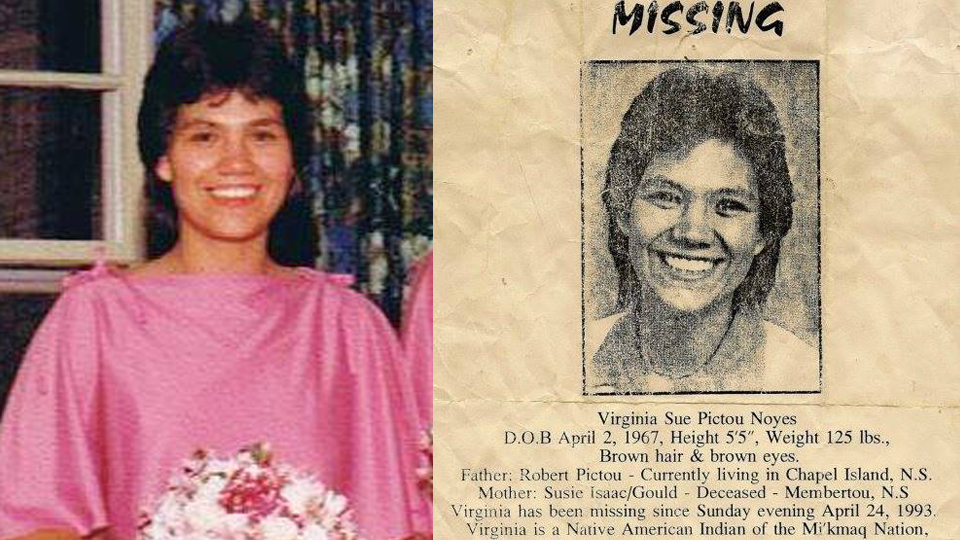MMIW
Virginia Sue Pictou-Noyes
'We'll bring her home one way or another'

caption
Virginia Sue Pictou-Noyes
caption
Virginia Sue Pictou-Noyes was last seen in 1993.Agnes Gould, known as Aggie Baby, has been looking for her sister for over 23 years, but her search knows no borders. Though Virginia Sue Pictou-Noyes went missing from a Maine hospital, she was still in Mi’kmaq territory that stretches from the Atlantic, out to Quebec and down to New England.
Gould doesn’t call Virginia missing or murdered, but “taken.”
“Taken either by them being missing or by them being murdered,” she says.
Virginia and her family were raised in Membertou, near Sydney.
Virginia walked out of the Eastern Maine Medical Center in Bangor on April 24, 1993. She was there after being badly beaten, Gould says, and disappeared when hospital staff turned away to work on a more life-threatening case. No trace of her has been found since.
Gould says that stories of women like Virginia often label them first as an alcoholic, a drug addict, a human trafficking victim or homeless.
“That’s the first thing,” she says, “instead of my sister was a 26-year-old mother of five.”
Gould says her sister had been beaten up and was picked up in front of a bar. “That’s where her husband was,” Gould says, “so she went there.”
Virginia wasn’t an alcoholic, Gould adds.
Gould remembers a woman who loved to make people laugh and play sports. Her children and family were central to her life.
As Virginia’s older sister, Gould helped take care of her. They would later be pregnant at the same time. Though Virginia dropped out of school, she would later return in her 20s to get her high school equivalency and had plans for further education.
“The only memory that her children have,” Gould says, “is that the detective comes every April and asks them, ‘Have you heard or seen your mother?’”
Gould notes that her family came together after Virginia went missing. Every August the family gathers to search for her in Maine, in an area where it might be likely she’d be found.
Her brother Robert, who lives in B.C., made a beaded portrait of Virginia using traditional beadwork techniques. It attracted enough attention that he’s decided to do a series — one taken woman from every province.
Gould lived briefly in Arizona but returned to Cape Breton. She says living on the island is as much a joy as a duty in case her sister should wind up coming home. She continues to look for her sister everywhere she goes, handing out flyers along the way.
Every speaking engagement or media interview is a means to an end.
“The focus is to bring her home,” Gould says. “If she has amnesia then at least we know she’s alive. If she’s been abducted and whatever, maybe she’s alive. That’s the hope.”
Gould pauses. “Now let’s have a bit of reality,” she says, noting even a closed-casket funeral would bring closure.
“We’ll bring her home one way or another.”
Gould has made a series of beaded medicine bags — one with the name of each of Virginia’s children — but she won’t put the medicine in them until the story has an end.
“What happened on that night that she disappeared?” Gould asks. “What happened after she left? Nobody knows.”
“That’s the story that nobody can publish.”
This profile was produced as part of a partnership between The Signal and Kukukwes.com ahead of the national inquiry into missing and murdered Indigenous women and girls.

